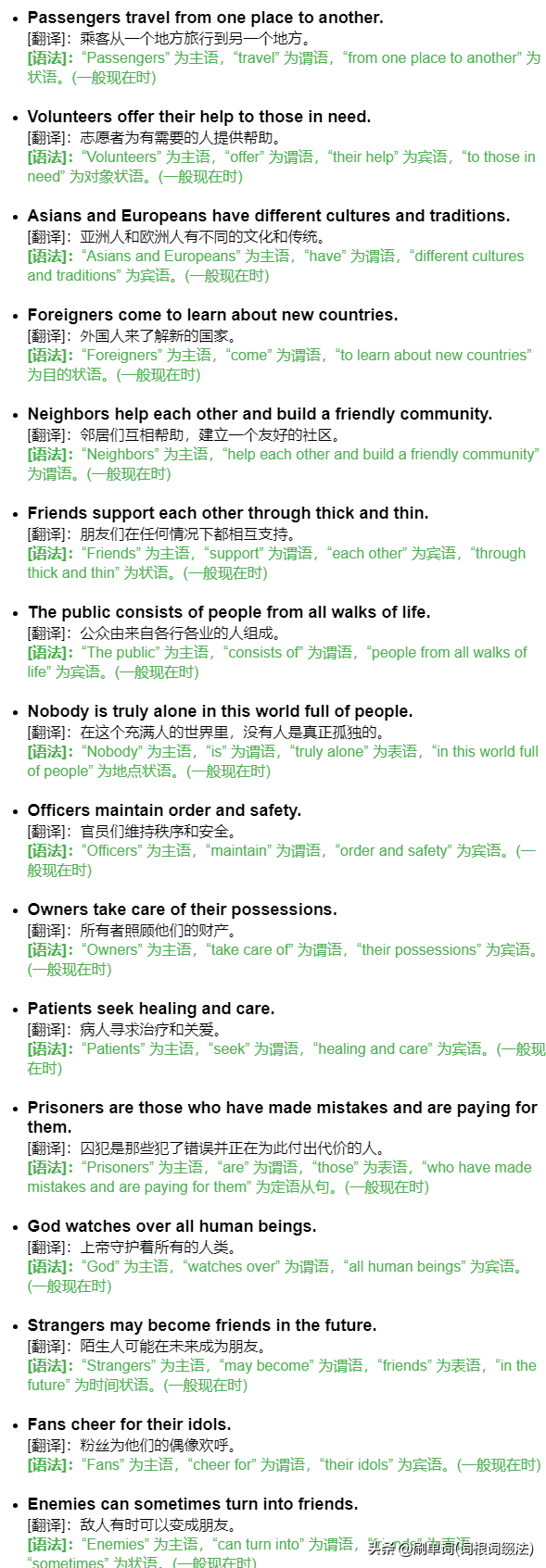今天安安老师连载本人原创课程《70篇美文巧记英语3000单词》第2讲。本套课程适合有一定英语基础知识,掌握单词量在800词及以上学习,零基础的同学请查找安安老师的《零基础英语学英语800词》。今天分享的篇名为《Diverse World of People》(《多彩的人类世界》)。本篇短文包含的19个英语句子,串讲47个与"人、人的身份"相关的英语单词,学习和复习以下语法知识点:句子的主、谓、宾分析,地点状语,伴随状语,目的状语,时间状语,定语从句。本讲包含以下内容:中英文对照文本、逐句语法知识点讲解、音频、电子文档、单词表及记忆方法。

【第一部分】本文电子档《Diverse World of People》《多彩的人类世界》(第2讲,共70讲)
In this vast world, there are all kinds of people.[翻译]:在这个广阔的世界里,有各种各样的人。[语法]:“In this vast world” 为地点状语。这是一个 “there be” 句型。“there be” 句型表示 “某地或某时存在某人或某物”,在这个句子中,“there are” 是谓语,表示 “存在” 的意思。“all kinds of people” 为表语。(一般现在时)Adults are busy with their work and responsibilities.[翻译]:成年人忙于他们的工作和责任。[语法]:“Adults” 为主语,“are” 为谓语,“busy with their work and responsibilities” 为表语。(一般现在时)Teenagers are full of energy and dreams.[翻译]:青少年充满活力和梦想。[语法]:“Teenagers” 为主语,“are” 为谓语,“full of energy and dreams” 为表语。(一般现在时)Kids and children run and play, enjoying their innocent days.[翻译]:孩子和小孩们奔跑玩耍,享受着他们天真无邪的日子。[语法]:“Kids and children” 为主语,“run and play” 为谓语,“enjoying their innocent days” 为伴随状语。(一般现在时)Boys and girls attend school together and make friends with theirmates.[翻译]:男孩和女孩一起上学,并和他们的同学交朋友。[语法]:“Boys and girls” 为主语,“attend school together and make friends with theirmates” 为谓语。(一般现在时)There are also gentlemen and ladies, showing courtesy and kindness.[翻译]:也有绅士和女士,展现出礼貌和善良。[语法]:“There are” 为谓语,“gentlemen and ladies” 为表语,“showing courtesy and kindness” 为伴随状语。(一般现在时)Miss, Mrs., and Ms. represent different stages of women's lives.[翻译]:小姐、夫人和女士代表着女性生活的不同阶段。[语法]:“Miss, Mrs., and Ms.” 为主语,“represent” 为谓语,“different stages of women's lives” 为宾语。(一般现在时)Mr. and Sir are used to address men with respect.[翻译]:先生和阁下是用来尊敬地称呼男性。[语法]:“Mr. and Sir” 为主语,“are used” 为谓语,“to address men with respect” 为目的状语。(一般现在时)Some are heroes who save others in times of danger.[翻译]:有些人是英雄,在危险时刻拯救他人。[语法]:“Some” 为主语,“are” 为谓语,“heroes” 为表语,“who save others in times of danger” 为定语从句。(一般现在时)Some are pioneers who lead the way in different fields.[翻译]:有些人是先锋,在不同领域引领道路。[语法]:“Some” 为主语,“are” 为谓语,“pioneers” 为表语,“who lead the way in different fields” 为定语从句。(一般现在时)Winners are those who achieve great things through hard work.[翻译]:胜利者是那些通过努力取得伟大成就的人。[语法]:“Winners” 为主语,“are” 为谓语,“those” 为表语,“who achieve great things through hard work” 为定语从句。(一般现在时)Tourists and visitors explore different places and experience new cultures.[翻译]:游客和参观者探索不同的地方,体验新的文化。[语法]:“Tourists and visitors” 为主语,“explore different places and experience new cultures” 为谓语。(一般现在时)Passengers travel from one place to another.[翻译]:乘客从一个地方旅行到另一个地方。[语法]:“Passengers” 为主语,“travel” 为谓语,“from one place to another” 为状语。(一般现在时)Volunteers offer their help to those in need.[翻译]:志愿者为有需要的人提供帮助。[语法]:“Volunteers” 为主语,“offer” 为谓语,“their help” 为宾语,“to those in need” 为对象状语。(一般现在时)Asians and Europeans have different cultures and traditions.[翻译]:亚洲人和欧洲人有不同的文化和传统。[语法]:“Asians and Europeans” 为主语,“have” 为谓语,“different cultures and traditions” 为宾语。(一般现在时)Foreigners come to learn about new countries.[翻译]:外国人来了解新的国家。[语法]:“Foreigners” 为主语,“come” 为谓语,“to learn about new countries” 为目的状语。(一般现在时)Neighbors help each other and build a friendly community.[翻译]:邻居们互相帮助,建立一个友好的社区。[语法]:“Neighbors” 为主语,“help each other and build a friendly community” 为谓语。(一般现在时)Friends support each other through thick and thin.[翻译]:朋友们在任何情况下都相互支持。[语法]:“Friends” 为主语,“support” 为谓语,“each other” 为宾语,“through thick and thin” 为状语。(一般现在时)The public consists of people from all walks of life.[翻译]:公众由来自各行各业的人组成。[语法]:“The public” 为主语,“consists of” 为谓语,“people from all walks of life” 为宾语。(一般现在时)Nobody is truly alone in this world full of people.[翻译]:在这个充满人的世界里,没有人是真正孤独的。[语法]:“Nobody” 为主语,“is” 为谓语,“truly alone” 为表语,“in this world full of people” 为地点状语。(一般现在时)Officers maintain order and safety.[翻译]:官员们维持秩序和安全。[语法]:“Officers” 为主语,“maintain” 为谓语,“order and safety” 为宾语。(一般现在时)Owners take care of their possessions.[翻译]:所有者照顾他们的财产。[语法]:“Owners” 为主语,“take care of” 为谓语,“their possessions” 为宾语。(一般现在时)Patients seek healing and care.[翻译]:病人寻求治疗和关爱。[语法]:“Patients” 为主语,“seek” 为谓语,“healing and care” 为宾语。(一般现在时)Prisoners are those who have made mistakes and are paying for them.[翻译]:囚犯是那些犯了错误并正在为此付出代价的人。[语法]:“Prisoners” 为主语,“are” 为谓语,“those” 为表语,“who have made mistakes and are paying for them” 为定语从句。(一般现在时)God watches over all human beings.[翻译]:上帝守护着所有的人类。[语法]:“God” 为主语,“watches over” 为谓语,“all human beings” 为宾语。(一般现在时)Strangers may become friends in the future.[翻译]:陌生人可能在未来成为朋友。[语法]:“Strangers” 为主语,“may become” 为谓语,“friends” 为表语,“in the future” 为时间状语。(一般现在时)Fans cheer for their idols.[翻译]:粉丝为他们的偶像欢呼。[语法]:“Fans” 为主语,“cheer for” 为谓语,“their idols” 为宾语。(一般现在时)Enemies can sometimes turn into friends.[翻译]:敌人有时可以变成朋友。[语法]:“Enemies” 为主语,“can turn into” 为谓语,“friends” 为表语,“sometimes” 为状语。(一般现在时)【第二部分】音频
(友情提醒:音频仅支持头条手机端,电脑端浏览器看不到播放器。)
【第三部分】电子文档


【第四部分】巧记单词
重点单词速记技巧adult ['ædʌlt] n. 成年人【巧记法】 ad(加强)+ult(成长)→完全成长的人→成年人Asian [ˈeɪʃn] adj. 亚洲的;n. 亚洲人【巧记法】 Asia(亚洲)+n(表示人或形容词后缀)→亚洲人;亚洲的baby ['beɪbi] n. 婴儿【巧记法】 ba(像婴儿哭声 "ba")+by(后缀)→婴儿boy [bɔɪ] n. 男孩【巧记法】 bo(发音似 "宝",宝贝)+y(后缀)→被视为宝贝的→男孩child [tʃaɪld] n. 孩子【巧记法】 chi(发音似 "吃",孩子爱吃)+ld(后缀)classmate ['klɑːsmeɪt] n. 同班同学【巧记法】(班级)+mate(伙伴)→班级里的伙伴→同班同学elder ['eldə(r)] n. 长者;adj. 年长的【巧记法】 eld(年老)+er(人或形容词后缀)→年老的人→长者;年长的enemy ['enəmi] n. 敌人【巧记法】 en(使)+em(对立)+y(名词后缀)→使之对立的人→敌人European [ˌjʊərəˈpiːən] adj. 欧洲的;n. 欧洲人【巧记法】 Europe(欧洲)+n(表示人或形容词后缀)→欧洲人;欧洲的fan [fæn] n. 迷;风扇【巧记法】 发音模仿风扇的声音,迷对某人事物着迷如风扇转动→迷;风扇foreigner [ˈfɔːrənə(r)] n. 外国人【巧记法】 fore(外面的)+ign(人)+er→外面来的人→外国人friend [frend] n. 朋友【巧记法】 同义对比记忆法:friend 常用,companion 更强调陪伴的关系。gentleman [ˈdʒentlmən] n. 绅士【巧记法】 gentle(温和的)+man(人)→温和的人→绅士girl [ɡɜːl] n. 女孩【巧记法】 gir(来自 gentle,温柔的,女孩常温柔)+l(后缀)god [ɡɒd] n. 神;上帝【巧记法】 和 good(好的)对比记,god 是神,good 是好的。guest [ɡest] n. 客人【巧记法】 同义对比记忆法:guest 常用,visitor 更通用。hero [ˈhɪərəʊ] n. 英雄【巧记法】 同义对比记忆法:hero 常用,champion 更强调在竞赛或斗争中的胜利者。human ['hjuːmən] adj. 人的;n. 人【巧记法】 hu(发音似 "呼",人会呼吸)+man(人,与之对比)→人的;人kid [kɪd] n. 小孩【巧记法】 ki(发音似 "可",可爱,小孩可爱)+d(后缀)lady [ˈleɪdi] n. 女士【巧记法】 同义对比记忆法:lady 常用,woman 更通用。madam [ˈmædəm] n. 夫人;女士【巧记法】 同义对比记忆法:madam 常用,lady 更通用。man [mæn] n. 男人;人类【巧记法】 ma(发音似 "妈",妈妈对应男性)+n(后缀)→男人;人类常由男人代表member [ˈmembə(r)] n. 成员【巧记法】 拆解记忆法: mem(记忆)+ ber(人),记忆中的人,成员Miss [mɪs] n. 小姐【巧记法】 同义对比记忆法:miss 常用,lose 更侧重于失去Mr. [ˈmɪstə(r)] n. 先生【巧记法】 可直接记忆,用于称呼男性。Mrs. [ˈmɪsɪz] n. 夫人,太太【巧记法】 可联想为 Mistress 的缩写,用于称呼已婚女性。Ms. [mɪz] n. 女士【巧记法】 可联想为 Miss 和 Mrs. 的结合,用于不清楚婚姻状况的女性称呼。neighbour [ˈneɪbə(r)] n. 邻居【巧记法】 neigh(附近)+bour(人),住在附近的人即邻居。nobody [ˈnəʊbədi] pron. 没有人【巧记法】 no(没有)+body(人)→没有人officer [ˈɒfɪsə(r)] n. 军官;公务员【巧记法】 offic(职责)+er(人)→履行职责的人→军官、公务员owner [ˈəʊnə(r)] n. 所有者【巧记法】 own(拥有)+er(人)→拥有者→所有者passenger [ˈpæsɪndʒə(r)] n. 乘客【巧记法】 pass(通过)+eng(带来)+er(人)→被带来通过的人→乘客patient [ˈpeɪʃnt] n. 病人;adj. 有耐心的【巧记法】 pati(忍受)+ent(人或物)→忍受痛苦的人→病人;能忍受的→有耐心的people ['piːpl] n. 人;人们【巧记法】 peo(来自 person,人)+ple(后缀)→人;人们person ['pɜːsn] n. 人【巧记法】 per(每一个)+son(人,与之对比)→每一个人→人person ['pɜːsn] n. 人【巧记法】 per(每一个)+son(人,与之对比)→每一个人→人pioneer [ˌpaɪəˈnɪə(r)] n. 先锋;开拓者【巧记法】 pione(开拓者)+er(人)→开拓者prisoner [ˈprɪznə(r)] n. 囚犯【巧记法】 prison(监狱)+er(人)→监狱里的人→囚犯public [ˈpʌblɪk] n. 公众;adj. 公共的【巧记法】 同义对比记忆法:public 常用,common 更强调共同的sir [sɜː(r)] n. 先生;阁下【巧记法】 可直接记忆,用于较为正式的称呼。stranger [ˈstreɪndʒə(r)] n. 陌生人【巧记法】 strange(陌生的)+r(人),陌生的人即陌生人。teenager [ˈtiːneɪdʒə(r)] n. 青少年【巧记法】 teen(青少年时期)+age(年龄)+r→青少年时期的人→青少年tourist [ˈtʊərɪst] n. 游客【巧记法】 tour(旅行)+ist(人)→旅行的人→游客visitor [ˈvɪzɪtə(r)] n. 游客;访问者【巧记法】 visit(参观、访问)+or(人)→参观的人、访问的人→游客、访问者volunteer [ˌvɒlənˈtɪə(r)] n. 志愿者【巧记法】 volunt(自愿)+eer(人)→自愿的人→志愿者winner [ˈwɪnə(r)] n. 获胜者【巧记法】 win(赢)+ner(人)→赢的人→获胜者woman ['wʊmən] n. 女人【巧记法】 wo(发音似 "我",我是女人)+man(男人,与之对比)→女人